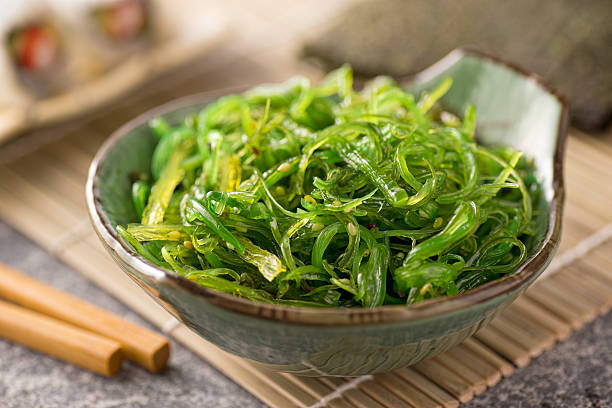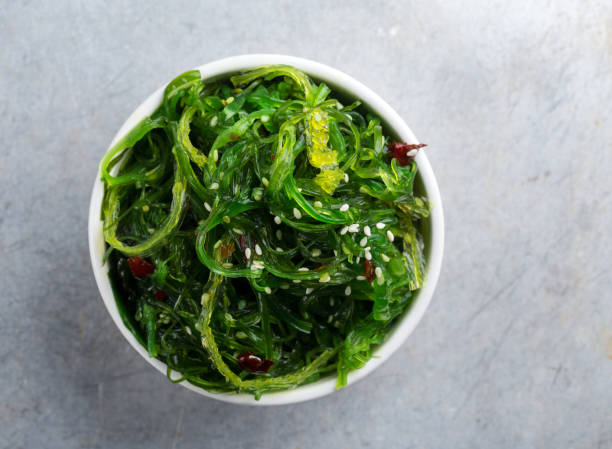Seaweed salad is a popular dish that has gained popularity in recent years due to its health benefits and delicious taste. This salad is made from various types of seaweed, such as wakame, hijiki, arame, and dulse, and is often mixed with other ingredients such as sesame seeds, ginger, soy sauce, and vinegar. In this article, we will take a closer look at the calorie content of seaweed salad and what makes it such a nutritious and healthy food choice.
First, let’s examine the calorie content of seaweed salad. The exact number of calories in a serving of seaweed salad can vary depending on the ingredients and portion size, but on average, a one-cup serving contains around 40-50 calories. This is a very low calorie count compared to other types of salads, making seaweed salad a great choice for anyone who is trying to maintain a healthy weight or reduce their caloric intake.
One of the reasons why seaweed salad is so low in calories is due to its high fiber content. Fiber is an important nutrient that helps regulate digestion and can also help you feel full and satisfied after eating. This can help prevent overeating and snacking on unhealthy foods throughout the day. Additionally, seaweed is naturally low in fat, which also helps to keep the calorie count low.
In addition to being low in calories, seaweed salad is also a good source of essential vitamins and minerals. Seaweed is rich in iodine, which is important for maintaining a healthy thyroid function. Iodine is also essential for brain development and function. Seaweed is also a good source of iron, which is important for maintaining healthy blood cells and preventing anemia. Additionally, seaweed is a good source of calcium, which is important for strong bones and teeth.
However, it’s important to be aware that some seaweed salad recipes can contain a higher calorie content, especially if they include ingredients like sesame oil, sugar, or processed sauces. For example, a serving of seaweed salad that includes a generous amount of sesame oil or sugar can contain up to 150-200 calories. So, if you’re trying to keep your calorie intake in check, it’s best to choose seaweed salad recipes that are made with minimal added sugars and oils.
In addition to being low in calories, seaweed is also a great source of nutrition. Seaweed is high in iodine, which is important for maintaining a healthy thyroid. It’s also a good source of iron, calcium, and magnesium. These minerals are important for maintaining strong bones and supporting the overall health of the body. Additionally, seaweed is rich in antioxidants, which help to protect the body from damage caused by free radicals.
When it comes to fitting seaweed salad into a healthy diet, it’s important to keep portion sizes in mind. A serving size of seaweed salad is typically around 1 cup, which contains around 50-60 calories. If you’re trying to maintain a healthy diet, it’s a good idea to limit your portion sizes and pair your seaweed salad with other nutrient-dense foods, such as lean protein and whole grains. This will help to keep you full and satisfied, while still keeping your calorie intake in check.
Another important factor to consider when it comes to the health benefits of seaweed salad is its high antioxidant content. Antioxidants are compounds that help protect the body against damage from free radicals. Free radicals can cause oxidative stress, which can lead to a variety of health problems, including heart disease, cancer, and aging. By eating foods that are high in antioxidants, you can help protect your body from this damage and maintain good health.
Finally, seaweed salad is also a good source of omega-3 fatty acids, which are important for heart health. Omega-3 fatty acids have been shown to help lower cholesterol levels and reduce the risk of heart disease. They are also important for brain function and development, and can help reduce inflammation in the body.
In conclusion, seaweed salad is a delicious and nutritious food that is low in calories and high in essential vitamins and minerals. It is a great choice for anyone who is trying to maintain a healthy weight or improve their overall health. Whether you enjoy seaweed salad as a side dish or as a main course, it is a great way to get more of this important food into your diet. So next time you are looking for a healthy and tasty food option, consider giving seaweed salad a try!

 Home
Home Health
Health Diet & Nutrition
Diet & Nutrition Living Well
Living Well More
More












